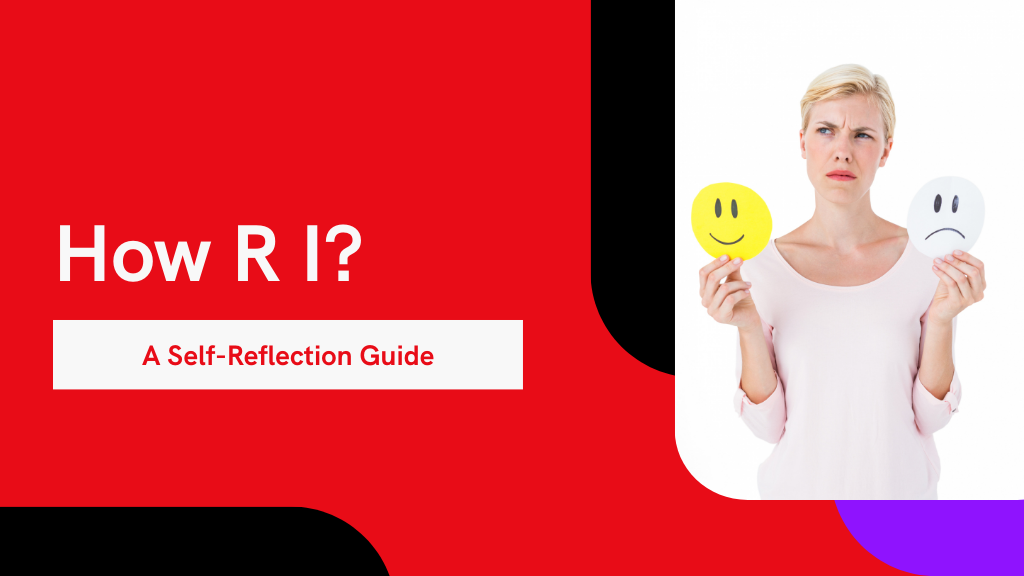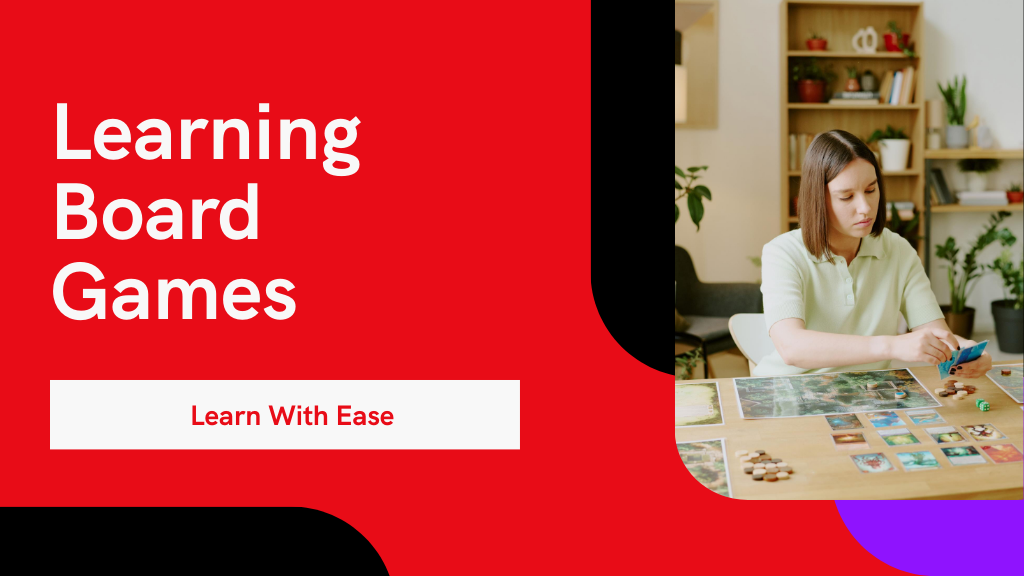
When you ask yourself "How R I" in self-reflection, you're doing a quick check-in on your feelings, thoughts, and behaviors to better understand your emotional state. This simple question helps you pause, notice what's really going on inside, and align your actions with your values. It encourages honesty and emotional awareness, making it easier to identify patterns and foster personal growth. Keep exploring to discover practical ways to use this for lasting change.
Understanding the Phrase "How R I" in Self-Reflection
How often do you pause to ask yourself, "How R I?" This simple phrase acts as a quick check-in, prompting you to assess your emotional and mental state.
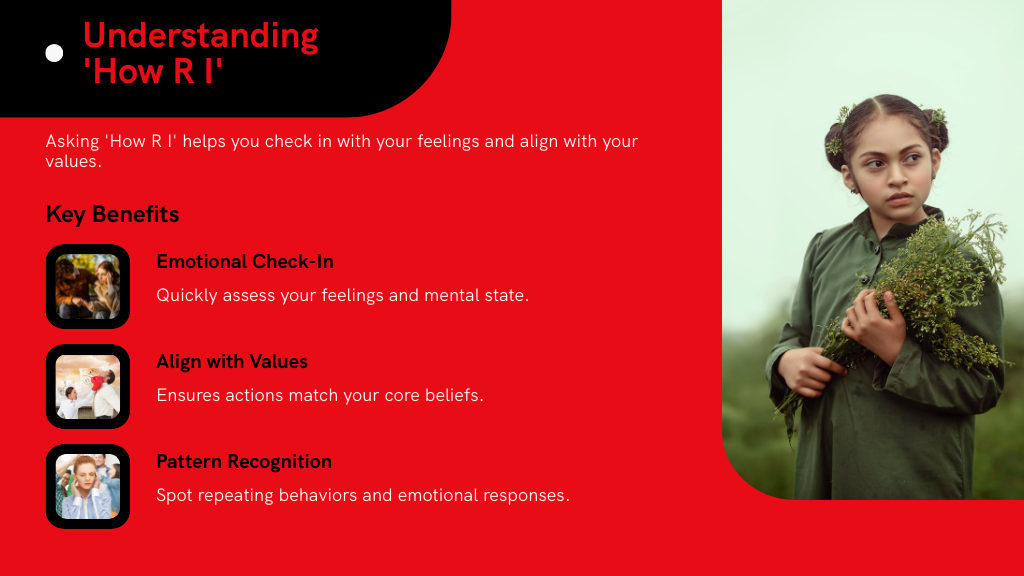
In the context of self-reflection, "How R I" encourages you to explore your feelings, thoughts, and behaviors, helping you better understand your emotional well-being. It’s a shorthand tool that invites intentional pauses amid daily distractions, allowing you to evaluate how aligned you are with your values and goals.
The Role of Self-Reflection in Personal Growth
When you take time to reflect on your thoughts and actions, you open the door to meaningful personal growth. Self-reflection helps you assess your behaviors and motivations, giving you deeper insight into your life choices.
By regularly practicing self-reflection, you can spot patterns that either enhance your happiness or hold you back. This awareness empowers you to manage your life proactively, making intentional changes instead of just reacting to circumstances.
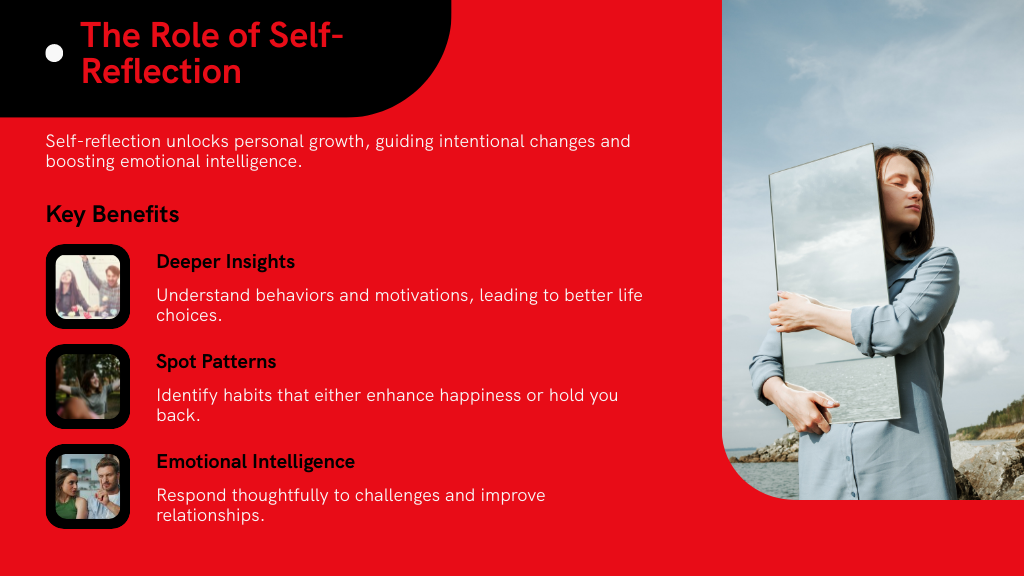
Regular self-reflection reveals patterns that shape your happiness and guides intentional, proactive life changes.
Additionally, self-reflection builds emotional intelligence by helping you respond thoughtfully to challenges and improve your relationships.
Incorporating self-reflection into your routine—whether through journaling or meditation—clarifies your goals and boosts well-being, supporting your continuous journey of personal growth and self-improvement.
Key Elements of Effective Self-Reflection
Three key elements make self-reflection truly effective: evaluating your behaviors and emotions, using structured methods like journaling, and asking targeted questions that encourage accountability.
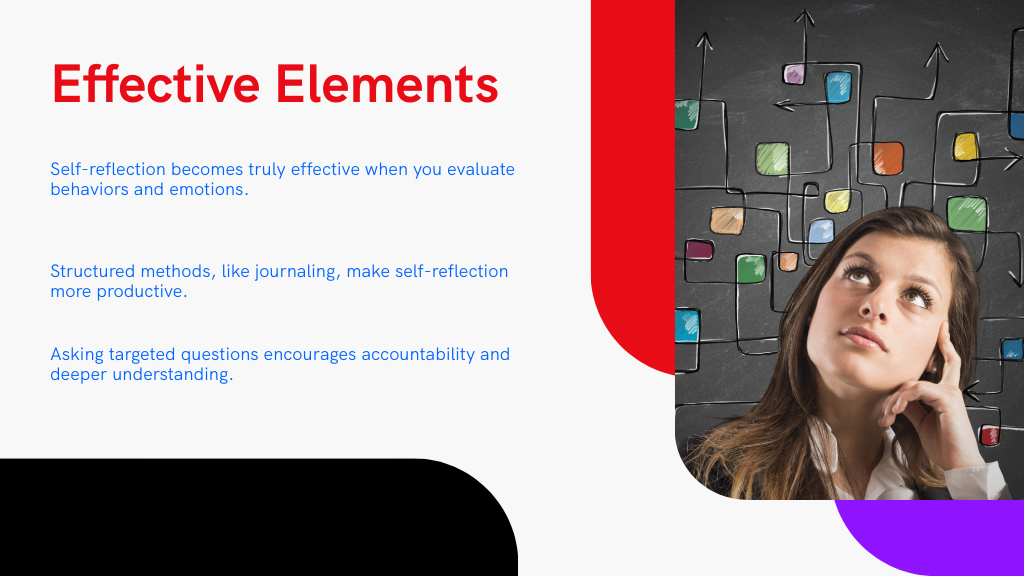
When you assess your thoughts and actions, you gain clearer insights into what drives you, which is essential for personal growth. Using tools like journaling helps you track patterns and review past experiences, making your self-reflection more focused and productive.
Additionally, targeted questions such as “What role did I play here?” push you to take responsibility and deepen your understanding of how your actions affect outcomes.
Emotional Awareness Through Self-Inquiry
To build emotional awareness, you need to start by recognizing your inner feelings without judgment. Asking yourself honest questions about why you feel a certain way helps uncover the root of your emotions. This kind of self-inquiry creates space for understanding and growth.
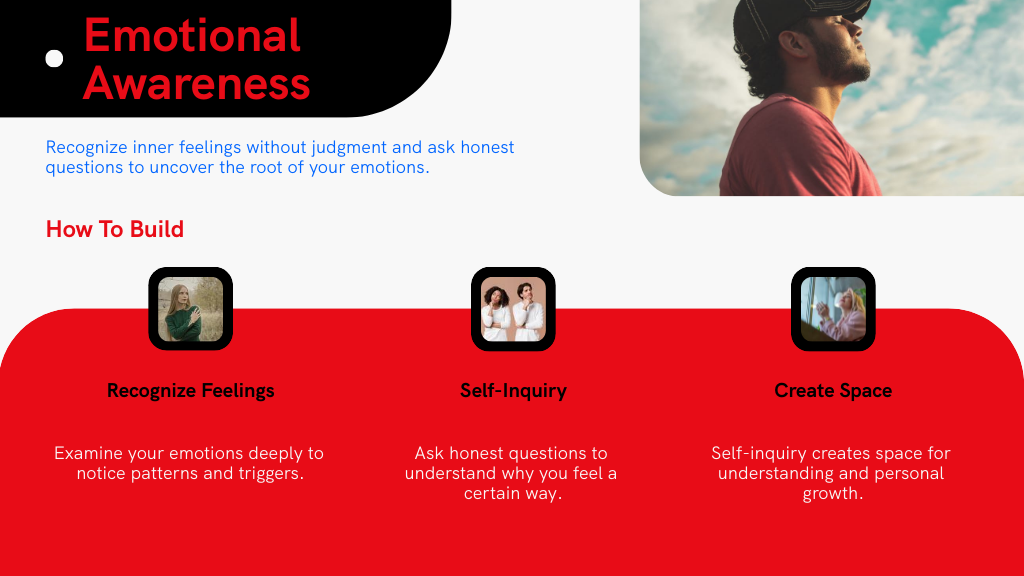
Recognizing Inner Feelings
How often do you pause to truly check in with your feelings? Recognizing inner feelings is a crucial step in emotional awareness and self-reflection.
When you take time to examine your emotions deeply through self-inquiry, you start to notice patterns and triggers that influence your reactions. This awareness helps you understand not just what you feel but why you feel that way.
By asking yourself questions like “How am I feeling right now?” you engage in meaningful self-reflection that connects you to your inner self. Techniques such as journaling or mindfulness meditation can support this process, making it easier to identify and regulate emotions thoughtfully. Developing this skill enhances your emotional intelligence and fosters personal growth.
Asking Honest Self-Questions
Although it can be challenging, asking yourself honest questions is key to truly understanding your emotions and motivations. Through self-inquiry, you deepen your emotional awareness, uncovering patterns that shape your behavior.
Reflective questions act as mirrors, revealing your true feelings and guiding you toward growth. When you engage in this process regularly, you become more proactive in handling challenges rather than reactive.
Try to focus on questions like:
- What emotions am I really feeling right now?
- Why did I react this way in that situation?
- What can I learn from these feelings to improve myself?
Identifying Patterns and Behaviors With "How R I"
Why pause and ask yourself "How R I"? This simple prompt encourages you to pause and examine your current thoughts, feelings, and behaviors.
By regularly reflecting with "How R I," you can identify patterns in your emotional responses and decision-making. This process boosts your self-awareness, helping you see how your actions align with your values.
When you notice discrepancies, it signals areas that might need change. Tracking these patterns over time allows you to observe shifts in mindset or behavior, making personal growth more tangible.
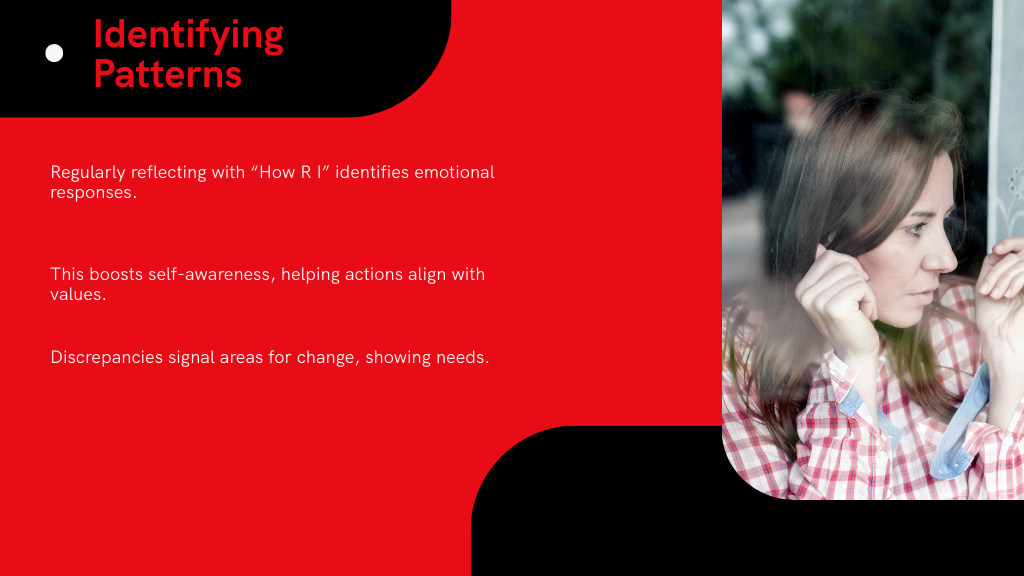
Using "How R I" as a steady self-reflection tool prompts you to critically analyze past experiences and their impact on your present, deepening your understanding of yourself and fostering continuous improvement.
Overcoming Barriers to Honest Self-Reflection
You might find it hard to face your true feelings because vulnerability feels risky and uncomfortable. Challenging your defensive mindset means accepting responsibility without shifting blame or avoiding tough truths.
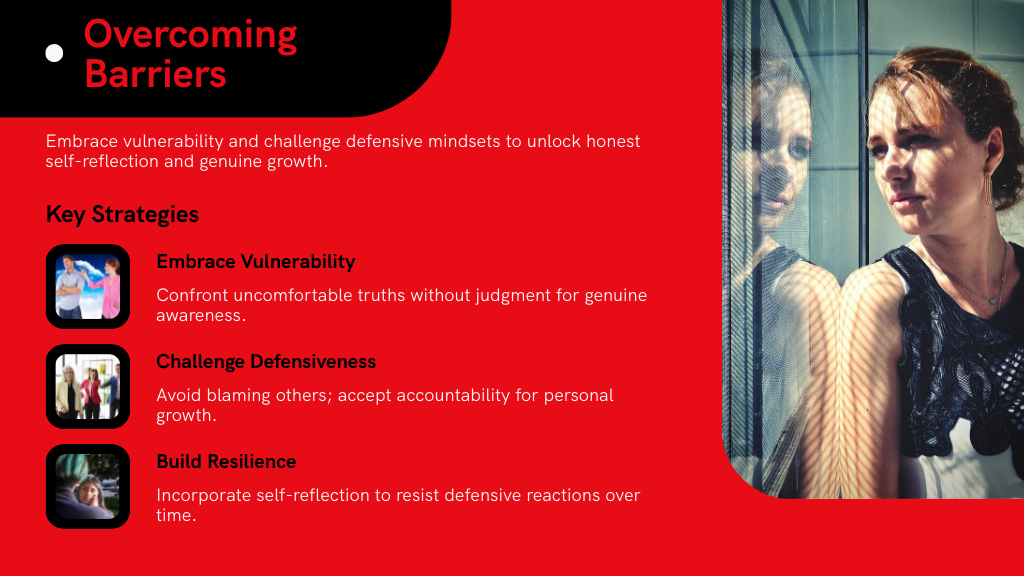
Embracing Vulnerability in Reflection
How can embracing vulnerability transform your self-reflection? When you allow yourself to confront uncomfortable truths without judgment, you open the door to genuine self-awareness and personal growth.
Vulnerability in self-reflection helps you uncover patterns, accept mistakes, and build emotional resilience. Creating a safe space for this honesty makes it easier to explore your feelings deeply.
By embracing vulnerability, you not only enhance your relationship with yourself but also with others, fostering connection and empathy.
- Feel the relief of unburdening hidden insecurities
- Experience the courage that fuels meaningful change
- Discover strength in accepting your imperfect self
Through vulnerability, your self-reflection becomes a powerful tool for transformation, leading to a more fulfilling and authentic life.
Challenging Defensive Mindsets
Although it can be uncomfortable, challenging defensive mindsets is essential for honest self-reflection. When you find yourself blaming others or external circumstances, you’re likely avoiding accountability. This defense mechanism blocks your ability to see your role in situations, which stalls personal growth.
To break through, you need to face uncomfortable truths about yourself, even if it feels intimidating. Embracing vulnerability by admitting mistakes opens the door to genuine self-awareness. Incorporating regular self-reflection into your routine helps you become more resilient against defensive reactions.
Over time, this practice fosters a proactive mindset that encourages continuous improvement. Remember, accountability isn’t about self-criticism but about understanding yourself better to grow and strengthen your relationships.
Practical Methods for Daily Self-Reflection
When’s the best time to pause and reflect each day? Carving out even a few minutes regularly helps deepen your self-awareness and keeps you connected with your inner world.
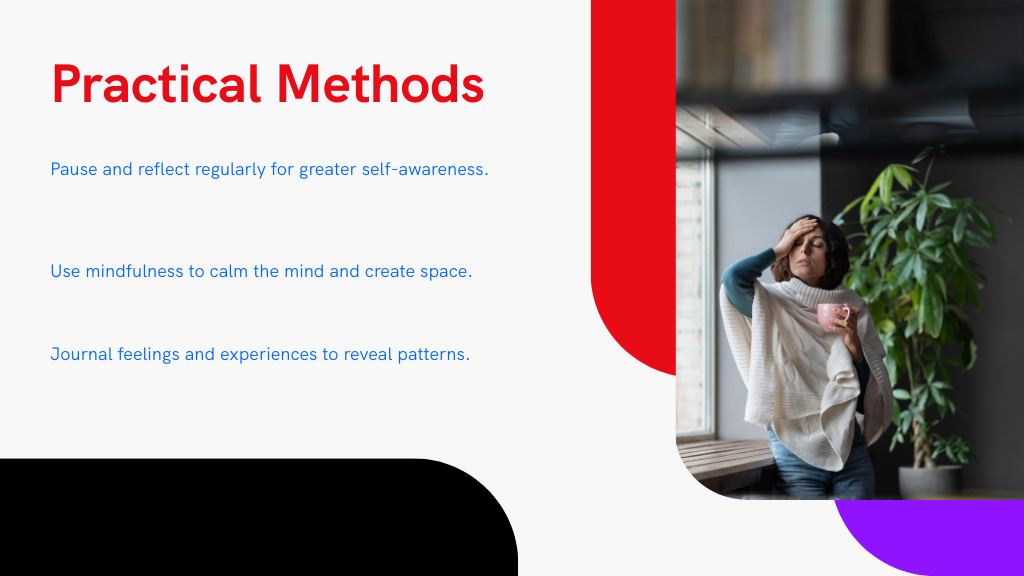
You can start by incorporating mindfulness practices like meditation or nature walks, which calm your mind and open space for honest reflection. Journaling is another powerful tool—writing down your feelings and experiences reveals patterns and insights you might miss otherwise.
Try these practical methods daily:
- Set a consistent time for reflection to build a habit
- Use prompts to guide your thoughts and discover hidden beliefs
- Combine mindfulness with journaling to enrich your understanding
This approach grounds you in the moment and strengthens your journey toward meaningful self-awareness.
You can boost your self-reflection by using specific journal techniques, like prompts or creative entries, to explore your thoughts and feelings. Reflection tools, such as apps or cards, offer structured ways to capture and review your experiences.
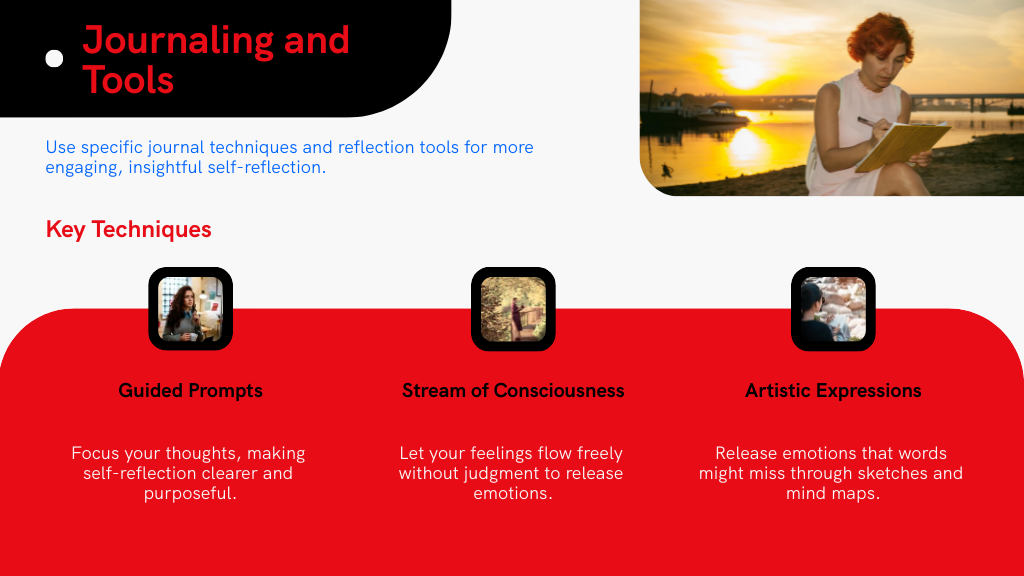
Journal Techniques
Three effective journaling techniques can transform your self-reflection practice by making it more engaging and insightful. Journaling isn’t just about writing; it’s about connecting with your inner self.
Using guided prompts helps focus your thoughts, making self-reflection clearer and more purposeful. You can also try stream of consciousness writing, letting your feelings flow freely without judgment. Finally, incorporating artistic expressions like sketches or mind maps can release emotions words might miss.
- Pour your heart out with stream of consciousness writing to release pent-up emotions.
- Use guided prompts to gently steer your reflections and discover hidden insights.
- Express feelings artistically to tap into deeper layers of your experience.
These techniques make journaling a powerful tool for growth and understanding.
Building on journaling techniques, using specific reflection tools can deepen your self-awareness and make your practice more effective.
Tools like Reflection.app and Reflection Cards guide your self-reflection by providing prompts and structured formats that help you identify patterns and areas for growth. By regularly documenting your thoughts and feelings, you promote personal growth and enhance emotional intelligence.
These reflection tools encourage you to analyze your motivations and reactions in various situations, improving how you understand yourself. You can also incorporate creative expressions like art or poetry into your journaling, offering fresh insights and a holistic approach to self-discovery.
Using these tools consistently makes self-reflection more accessible and impactful, empowering you to grow with clarity and intention.
How Self-Reflection Leads to Empowerment
When you take time to reflect on your thoughts and actions, you start to recognize your strengths and weaknesses, which empowers you to make better decisions and grow personally.
Self-reflection fuels empowerment by helping you identify patterns in your behavior, align actions with your true values, and take responsibility for your choices. This process builds your confidence and resilience, essential for personal growth.

Through self-reflection, you can:
- Understand your authentic self and clarify your goals
- Learn from past experiences without judgment
- Cultivate a mindset that embraces challenges as opportunities
Embracing self-reflection gives you the power to shape your life intentionally, releasing your potential and fostering lasting empowerment through continuous personal growth.
Integrating Self-Reflection Into Life for Lasting Change
Although self-reflection can be powerful on its own, integrating it regularly into your life is key to creating lasting change. By setting aside intentional time for practices like journaling or meditation, you deepen your understanding of your thoughts and behaviors.
Regular self-reflection helps you spot patterns, recognize both positive and negative influences, and make informed decisions for personal growth. Using tools such as self-reflection questions or apps can simplify continuous introspection, letting you capture insights and track your progress over time.
Committing to a weekly or monthly reflection schedule fosters accountability, encouraging proactive improvements. Embracing self-reflection as a continuous practice cultivates greater awareness, guiding you toward intentional living and meaningful, lasting transformation.
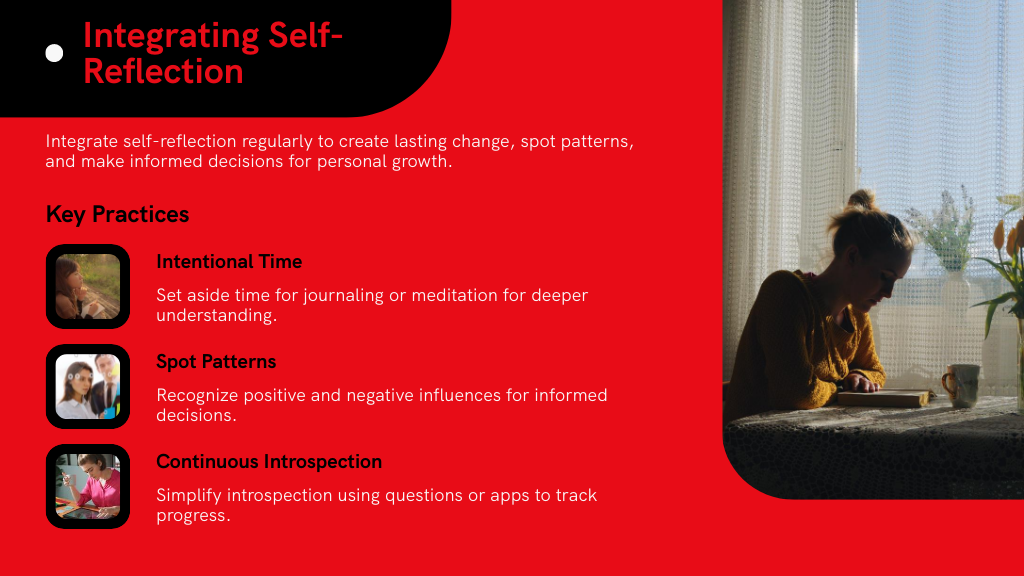
Conclusion
Just like a mirror shows your reflection clearly, asking yourself "How R I" helps you see your true emotions and behaviors. By regularly checking in with yourself, you’ll uncover patterns that hold you back and discover strengths you might’ve missed. Keep practicing this self-reflection daily, using tools like journals to guide you. Over time, you’ll feel more empowered and in control, turning insight into lasting personal growth.



